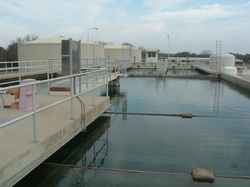
Brownwood News – The record-setting deep freeze weather of last week caused many problems for local residents — mostly because of loss of electrical power. But Brownwood and other area towns almost lost all water service.
John Allen, General Manager of the Brown County Water Improvement District, explained the near disaster. The District spent nearly two weeks preparing for the expected cold front, insulating pipes, applying heat tapes, etc., and believed they were ready. But on Monday, February 15, at 2:00 a.m. the District’s water treatment plant lost electrical power. Oncor, the local electrical power deliverer, was contacted, but told the District that it was a rolling blackout, the treatment plant was in a grid that was shut down, and it could not be restored.
After eleven hours the power did come back on at 1:00 p.m. The staff at the treatment plant got busy returning the plant to operation. Water and chemical lines and valves had to be thawed out, in some cases repaired or replaced. After about three hours the work was done and they were feeling good about the situation.
“About 5:00 o’clock we were feeling good about ourselves, believing we dodged a bullet, and then the power went out again,” said Allen. At that point the treatment plant had only about 50% of storage capacity in treated water. (The plant has three 1-million gallon storage tanks.) If the plant could not get powered back up and start treating more water, the tanks would run dry in 12 hours. That means the cities of Brownwood, Early, Bangs, Brookesmith, Zephyr, Santa Anna, etc. would all have been out of water on Tuesday morning.
“We begged, borrowed, and stole all the propane heaters we could find from our employees, friends, etc., just to try to keep things from freezing again. We had all the heat going everywhere we could, while we were still continuing to contact Oncor to try to have our power turned back on. We are critical infrastructure,” explained Allen.
Brownwood City Manager Emily Crawford contacted U.S. Congressman August Pfluger for help. Meanwhile, recently elected Water District Board of Directors member Johnny Hays called our Representative in the Texas Legislature, Dr. Glenn Rogers, who contacted the Governor’s Office and called Oncor. Allen said Rogers explained to Oncor that “the Governor’s orders were not to include critical infrastructure in these shutdowns.” All of that took several hours, but within 30 minutes of Rogers’ call electricity was once again restored to the plant at about 11:00 p.m.
During the power outage, the cities of Brownwood and Early continued to receive water because they are gravity-fed. Bangs and the Brookesmith Water District, however, are at a higher elevation and require pumps to get their water from the treatment plant. Their pump stations are adjacent to the plant and also lost power, thus Bangs and Brookesmith lost all water from the plant during the power outage. Zephyr is gravity fed, but their local pumps lost power, negatively affecting their ability to deliver water.
One lucky aspect of the incident. Years ago water flowed from Lake Brownwood to the treatment plant via an open canal, which could have frozen over, blocking or restricting water flow to the plant. Several years ago, however, the canal was replaced with underground pipes, so that water was protected from freezing.
Even with power restored to the plant, treatment was difficult. Allen said the incoming water temperature was only 38 degrees. At that temperature the water gets dense and does not move through the filtration membranes easily.
Allen praised his staff at the treatment plant. They worked double and triple shifts, around the clock, to keep the treated water flowing to the people of Central Texas. The water at plant Supervisor Cody Shannon’s house froze up and stayed that way for seven days, while he spent all his time working at the plant. Allen said he, Shannon, and the other plant employees and maintenance staff got about eleven hours of sleep all last week.
Once the weather warmed on Friday water shipments skyrocketed, due to leaks and the refilling of tanks. From 8:00 a.m. Friday to 8:00 a.m. Saturday the District shipped 10.1 million gallons of water, more than double a typical 24-hour figure for this time of year. In fact, in the hot summer last year the biggest day saw 9.5 million gallons shipped.
Allen said the water systems in Abilene, Fort Worth, and Austin went dry because their plants lost power. Brown County avoided such a fate due to preparation, help from Representative Glenn Rogers and the Governor’s Office, and heroic work by the staff of the Water District. We were very lucky.